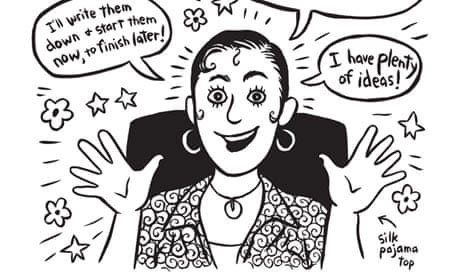Until she was 30, Ellen Forney, an award-winning Seattle-based artist, took her slightly unusual personality for granted. Her obsession with exercise, her impulsive sexuality, her bouts of ecstasy: she considered these things, however uncomfortable, a major part of who she was. After all, aren't all creative types given to strange moods, to pulling all-nighters, to forgetting to eat?
But then, everything changed. Having spent one summer feeling low, she started seeing a therapist – a woman who, alarmed by her client's now increasingly "jazzed" mood, duly referred her to a psychiatrist. Forney was breezy about this. Her depression was long gone; she had barely slept in months, she had lost a lot of weight and she felt… great.
Her psychiatrist, however, wasn't convinced, and during what was only Ellen's second appointment reached for the ominous blue telephone directory that is known as the DSM (Diagnostic and Statistical Manual of Mental Disorders). Together, they went through Ellen's symptoms. Persistently and abnormally elevated mood? Check. Inflated self-esteem and grandiosity during these moods? Check. Decreased need for sleep? Check. Racing thoughts? Check. Excessive involvement in pleasurable activities that have a high potential for painful consequences? Double check. Ellen, it seemed, was bipolar – or as she puts it in her new graphic memoir of this time: "I was officially a crazy artist."
When Marbles: Mania, Depression, Michelangelo & Me came out in the US last year, it was to a rapturous reception – and no wonder. Forney's account of her diagnosis and her subsequent decade-long struggle to stabilise her condition is an unexpectedly brilliant read. It's a difficult trick: to be both grave and funny at the same time, but somehow she has done it. The loopiest of her manic episodes make you smile even as you fear for her sanity; her low periods, meanwhile, she treats succinctly, knowing that depression is wearying for the reader (one page contains six frames, each filled with the same image of Ellen covered by a blanket on a sofa). As a result, the book races along. And it's surprisingly informative, too. Forney is good, without ever being preachy, on the help that is available, whether it be literature (she finds solace in the books she loved as a child, and in Kay Redfield Jamison's memoir, An Unquiet Mind) or pills (the book ends with a full list of those it takes to keep her on the road, from lithium to vitamin D).
But what really sets Marbles apart is its thoughtfulness, its philosophical bent. Forney is interested in the studies that correlate mania with creativity, and while she was relieved to discover that leaving "the Van Gogh club" left her no less able to work – happily, the lithium did not "flatten her out" – she remains convinced that her illness is "an important part of how I think". Even now she's well, she is still apt to rush out and have the words "Led Zep" tattooed on one of her molars (yes, really).
This seems to me to be rather an unfashionable point to make in our ever more medicalised world, and I found it fascinating and not a little brave. But then, that's her all over. Forney has a delightfully clear sense of self, and it's this that makes her book, for all its inherent pain, such a blast.

Comments (…)
Sign in or create your Guardian account to join the discussion